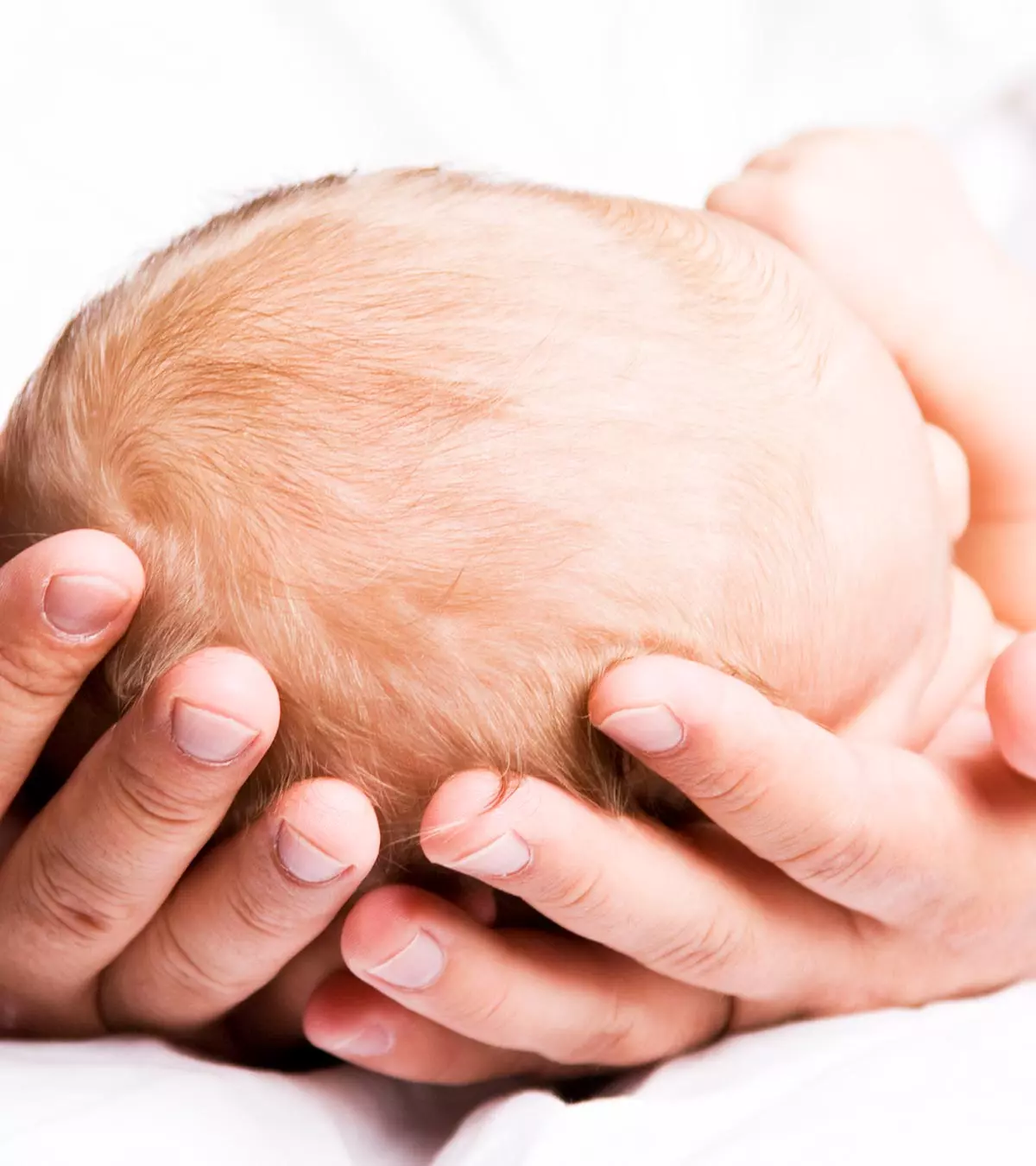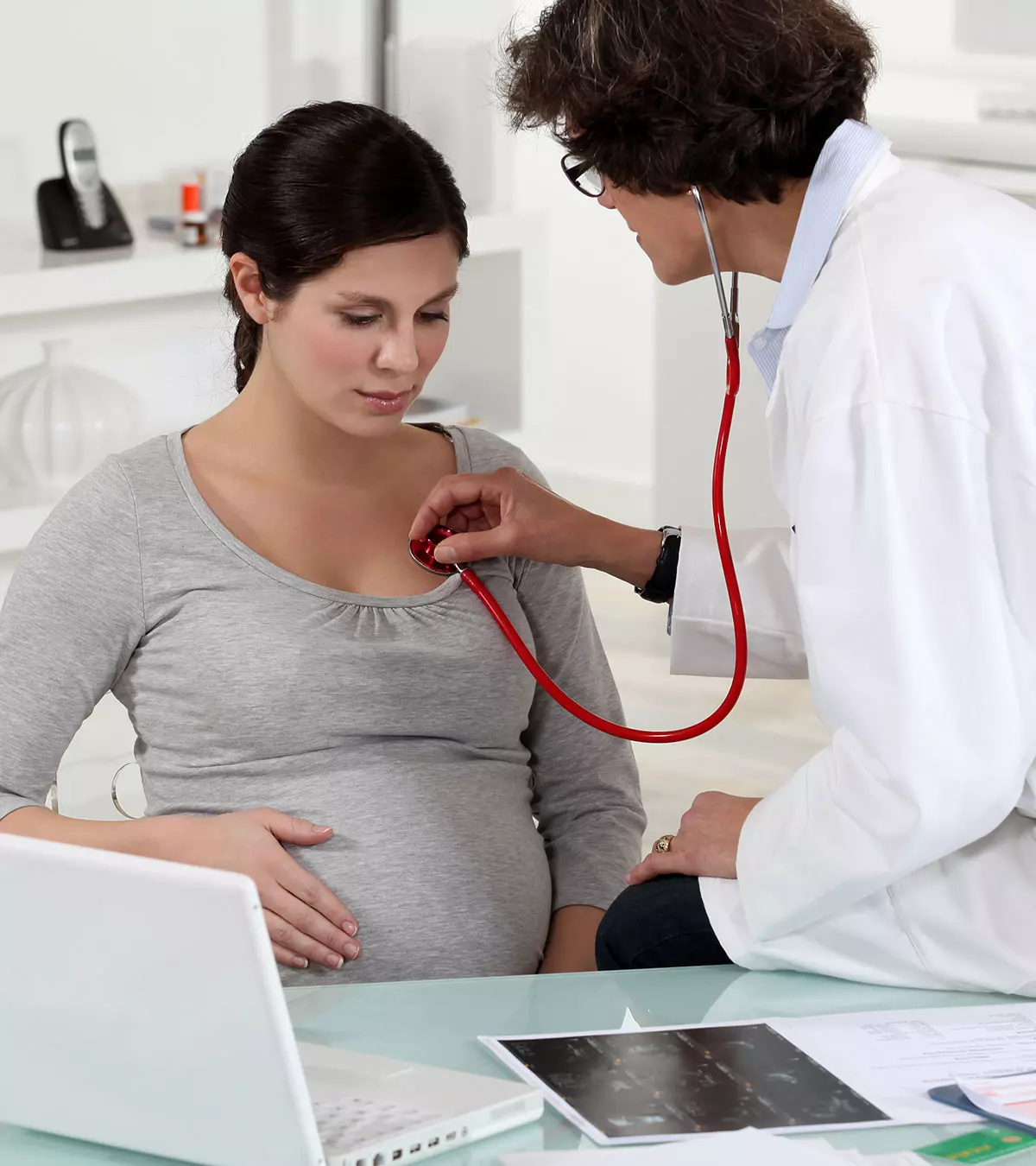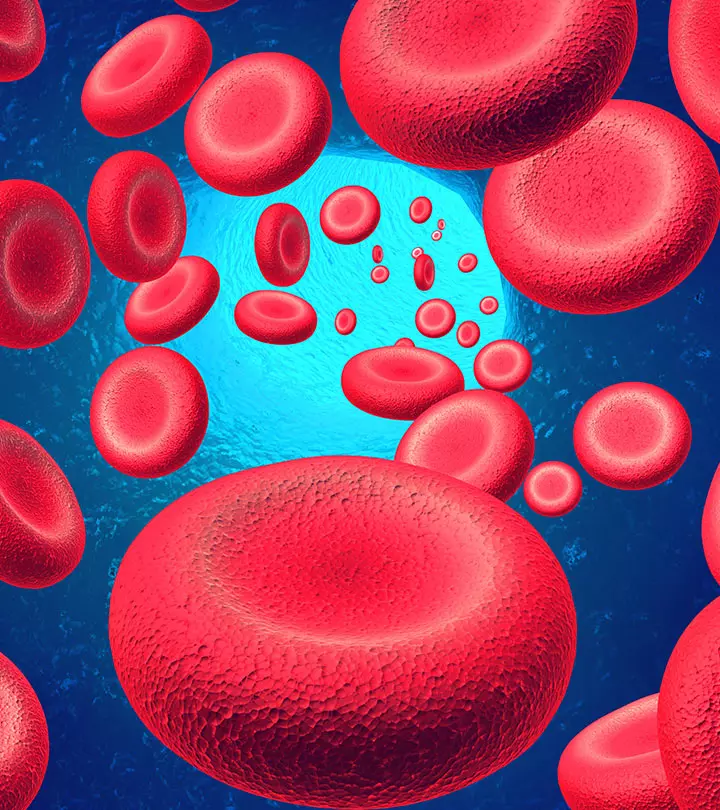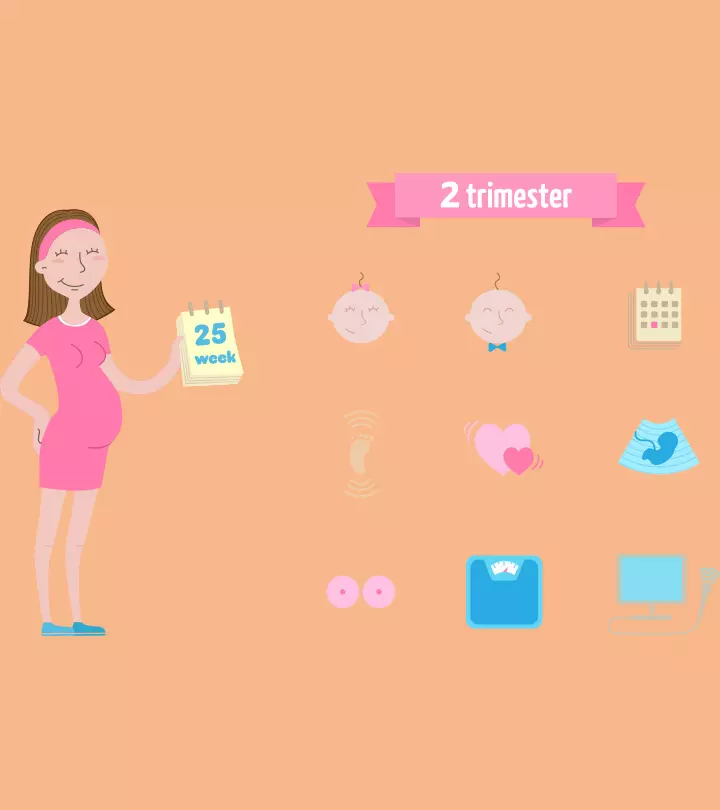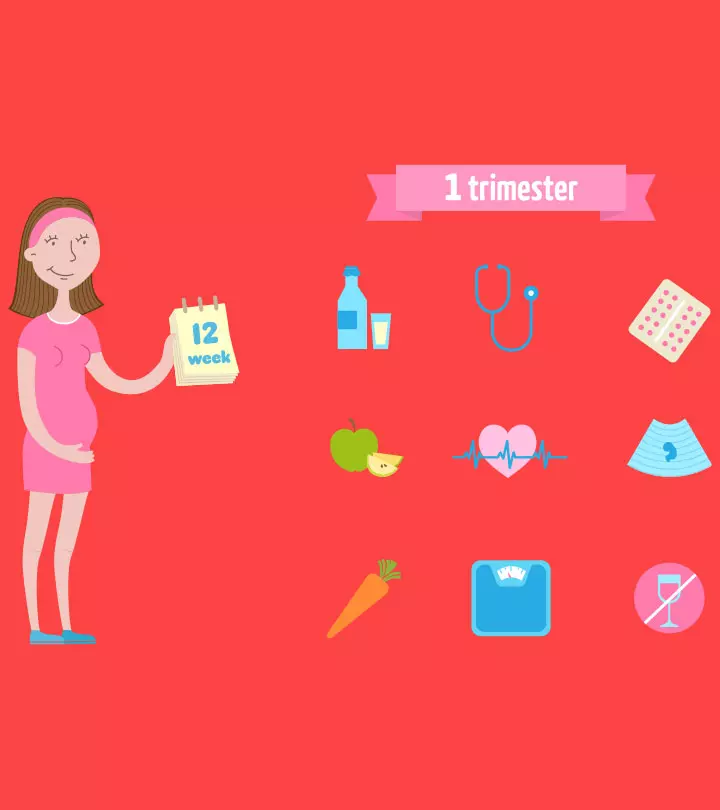
Image: Shutterstock
Pregnancy is divided into three trimesters based on the gestational age and the fetal development. The first trimester, which begins on the first day of your last menstrual cycle and ends until week 12 of gestation, is the most crucial stage for the baby’s growth (1) (2). A woman also goes through various physiological and emotional changes during this time.

Read on to learn everything about the changes in your body and the development of your fetus throughout the first trimester.
Key Pointers
- Some common changes noticed in women during the first trimester of pregnancy are a missed period, implantation bleeding, and breast tenderness.
- You should consult a doctor if you have severe abdominal cramps, dizziness, and painful urination.
- The baby’s growth turns from an ovum to a six-centimeter long fetus by the end of the first trimester.
First Trimester Changes In The Mother’s Body
The experts at UNICEF enlist the following as the common symptoms of pregnancy in the first trimester (3).
1. A missed period

A missed period is usually the first sign of conception. However, a woman can miss her period for reasons other than pregnancy as well.
2. Implantation bleeding
Implantation bleeding usually happens six to 12 days after ovulation when a fertilized egg implants itself in the lining of the uterus wall (4).
It is usually not a cause of concern but should be brought to the doctor’s attention, especially if the bleeding is heavy or persistent. The American Pregnancy Association states that about one-third of all pregnant women experience implantation bleeding.
3. Breast tenderness
Hormones of pregnancy, such as estrogen, progesterone, and prolactin, increase the sensitivity and tenderness of the breasts (5). These hormonal changes are likely to cause increased blood circulation to the breasts, causing fluid buildup and swelling. This, in turn, results in tender breasts during the first trimester (6).
 Things to know
Things to know4. Constipation
Increasing progesterone during pregnancy causes the intestinal muscles to relax, causing food and waste to move slower through the digestive system leading to constipation (7).
5. Vaginal discharge
During pregnancy, the cervix and the walls of the vagina become softer, and increased levels of progesterone cause an increase in the production of fluid. Increased vaginal discharge is normal, but if you notice any unusual color or foul smell, it is essential to notify your doctor about it (8).
6. Fatigue
Hormonal changes, especially the steep increase in progesterone, are responsible for fatigue in the first trimester (9).
7. Food likes and dislikes
It is common to develop a craving for some foods and dislikes or aversion to others in the first trimester (3).
8. Frequent urination
Increased pressure on the urinary bladder by the expanding uterus and the baby’s weight can lead to frequent urination (10).
9. Mood swings
Mood swings during pregnancy happen due to a combination of factors such as physical stress, fatigue, metabolic changes, and an increase in estrogen and progesterone.
Substantial hormonal fluctuations of the first trimester can affect the levels of neurotransmitters, too. Neurotransmitters are chemicals released by the brain and play a role in mood regulation(11).
10. Morning sickness
Morning sickness is characterized by nausea and vomiting in the first trimester. It is quite common, and at least seven in ten women experience morning sickness in the first trimester, which typically resolves by the second trimester (12). For some women, however, severe nausea and vomiting can sometimes be associated with dehydration, weight loss and electrolyte imbalances in a condition known as hyperemesis gravidarum. Speak to your healthcare provider if you suspect this.
 Quick tip
Quick tip11. Weight gain
0.5 to 2.0 kilograms or 1.1 to 4.4 pounds of weight gain is normal in the first trimester. If you lose or gain more than five to ten percent of your pre-pregnancy weight in the first trimester, you must speak to your healthcare provider (13).
12. Headache

Hormonal changes and an increase in blood volume may lead to headaches in the first trimester of pregnancy (14).
13. Heartburn
Hormonal changes often lead to heartburn in the first trimester of pregnancy (15).
14. Leg cramps
Leg cramps are most common in the third trimester but may occur at any time in pregnancy.
Weight gain and changes in blood circulation in pregnancy can lead to leg cramps (16).
15. Lower back and pelvic pain
Ligaments in the body become softer in pregnancy to aid childbirth. Soft ligaments can put a strain on the joints of the pelvis and lower back, leading to lower back and pelvic pain (17).
16. Acne
Acne during the first trimester is quite a common occurrence in women who have had a history of acne previously. However, this condition is not exclusive and may occur across over 40% of the pregnant population. During pregnancy, the androgen hormones (mainly progesterone) produced within the body tend to increase the oil production within the skin. This oil, along with bacteria and dead skin cells, tends to clog the skin pores, causing reddish and painful pus-filled bumps (or pimples) to appear under the skin (18) (19).
Dos And Don’ts In The First Trimester
Follow your gynecologist’s advice for self-care during pregnancy. The following are common dos and don’ts during the first trimester (20).
Dos:
- Continue your prenatal vitamins containing at least 400mcg of folic acid
- Continue mild exercises in the first trimester
- Stay regular with your prenatal visits and undergo tests such as ultrasound and amniocentesis as recommended by the doctor
- Incorporate lean meats, fruits, vegetables, and fiber into your diet

- Stay hydrated
- Focus on eating a balanced diet instead of counting calories
- Indulge in mild exercises, yoga, or stretching if your doctor recommends
Reflecting on her efforts to follow healthy eating habits during the first trimester of her pregnancy, Laura, a mother of two, explains, “Over the past three and half months, I’ve had to adjust my eating a bit. After I almost passed out on the subway during my morning commute (one of the scariest moments ever), I got serious about my eating schedule. I learned to eat protein every three to four hours. I always carry a water bottle and can’t overdo it on the sugar. Small, protein-packed meals every three to four hours throughout the day is how I do it (i).”
Don’ts:
- Avoid alcohol
- Limit caffeine intake
- Avoid contact with cat litter as it carries a risk of developing toxoplasmosis
- Avoid consuming uncovered, undercooked, and raw meat
- Avoid high-mercury or raw fishes
- Avoid direct or second-hand cigarette smoke
- Do not consume unpasteurized dairy products
Symptoms That Need Medical Attention

You should talk to your healthcare provider if you notice any of these symptoms in your first trimester (3)(21).
- Severe lower abdominal cramps
- Severe or long-lasting headache
- Dizziness
- Breathlessness, weakness, or racing heart
- Continuous or severe pain on one side of the abdomen
- Pain on the tip of the shoulder
- Fever over 38°C or 100°F
- Smelly vaginal discharge
- Painful urination
- Vaginal bleeding
- Severe vomiting with inability to tolerate food and/or water
- A blow to the stomach from an accident, violence, fall, or crash
Baby’s Growth In The First Trimester
By the end of the first trimester, the baby turns from being a little ovum to a six-centimeter long fetus. The baby’s heart begins to beat, and the brain and the spinal cord begin to form. The hands and legs appear as tiny buds. The circulatory system, nervous system, digestive system, and urinary system begin to develop. Tooth buds begin to form.
By the end of 12 weeks, the external genitalia, fingers, toenails, eyelids, and larynx begin to form. The fetal movement also begins, although the mother cannot feel the fetal movement yet. Read more about fetal development week by week in the first trimester here.
The fetus is most vulnerable in the first trimester. In this time period, all major organs and body systems are forming. However, the systems are not fully formed to support the fetus’ survival outside the mother’s body yet (22). If the fetus is exposed to conditions and substances, such as drugs, German measles, radiation, tobacco, and toxic substances, the newly formed organs may sustain damage. Therefore, it is vital to avoid substances and habits that could be hazardous to the fetus.
 Quick fact
Quick factThings To Consider During The First Trimester
Apart from physical changes, pregnancy and childbirth will affect many aspects of your life. You may take some time pondering and deciding over the following factors in the first trimester.
1. Informing your friends, family, and employer
The risk of miscarriage is highest in the first trimester. Many women may prefer waiting for 12 weeks before declaring their pregnancy. However, it is each woman’s choice to decide when to tell others about their pregnancy.
You should consider whether you will continue to work after delivering your child or not and if your employer offers maternity leave or not. Based on these factors, you may decide on when to inform your employer about your pregnancy.
2. Deciding your birth plan
You should research the available options and decide on your birth plan. You should also decide on your preferred place of childbirth and the preferred form of delivery, in conjunction with your healthcare provider. You may also think about your birth companions, your specific preferences regarding the birth environment, your choices for labor pain relief, and your choice of procedures to be avoided.
3. Paying for care
Many women worry about the costs of medical bills including the checkups and routine screening during their pregnancy. However, in several nations, there are many good insurance plans that cover prenatal and natal care. Talk to the hospital authorities to know about the available insurance options.
Frequently Asked Questions
1. Why is the first trimester so hard?
During the first trimester, there are many changes in the body. There is a spike in hormonal level and blood volume, which might increase breathing and heart rates. These changes could result in chronic fatigue, making the first trimester difficult (9).
2. Is bed rest required in the first trimester?
Women in the first trimester might be advised bed rest if there is a risk of miscarriage. Bedrest for all women is not advised since constant resting could increase the risk of depression, blood clots, and loss of bone strength. If your doctor has prescribed bed rest, discuss the pros and cons with them and remedies to reduce any discomfort during the resting period (23).
3. Can I sleep straight in the first trimester?
During the first trimester, you may sleep in any position you’re comfortable with since the belly is yet to grow. However, as the pregnancy progresses, the growing belly might pressure your lower back, making the straight position uncomfortable. Hence, to develop a habit, your medical professional might advise you to practice sleeping on the left side (24).
4. Is walking good for pregnancy in the first trimester?
Walking is a low-intensity exercise that could be beneficial for pregnant women. It is a beginner-friendly activity that might reduce the risk of preeclampsia and unhealthy gestational weight gain (25).
5. What vitamins should I take during the first trimester?
Calcium, iron, iodine, folate, vitamin D, and DHA are crucial prenatal vitamins. If you are deficient in these vitamins, your doctor might suggest some supplements. Please note that you must not take supplements unless prescribed and approved by a doctor (26).
6. Why is the first trimester so high risk?
It is during the first trimester that many of the fetus’s organs develop. Exposure to certain drugs, tobacco, and medications could affect the growth of the fetus and increase the risk of a miscarriage. Also, chromosomal anomalies in the fetus are identified during the first trimester. These may make the first trimester risky (22) (27).
The first trimester of pregnancy is twelve weeks from day one of the last known menstrual period. This is a crucial time in pregnancy since significant fetal development, including organ and organ system development, occurs. This is when moms may experience intense pregnancy symptoms such as morning sickness. You may take a home urine pregnancy test to confirm pregnancy as soon as the missed period. Seek prenatal care as soon as you know or suspect pregnancy, and begin with prenatal vitamins if you are not taking them already. Vitamins such as folic acid are most needed at this time to prevent any defects.
Infographic: Guidelines For A Safe Pregnancy During The First Trimester
The first trimester of pregnancy is a critical phase for the mother and the developing baby. Therefore, knowing some dos and don’ts and following them is essential for a healthy first trimester. Read through the infographic below to learn about the guidelines you should follow during the first trimester of pregnancy.
Some thing wrong with infographic shortcode. please verify shortcode syntaxEating well during your first trimester is essential for a healthy pregnancy. Learn how to make nutritious meals and snacks to nourish your body and baby.
Personal Experience: Source
MomJunction articles include first-hand experiences to provide you with better insights through real-life narratives. Here are the sources of personal accounts referenced in this article.
i. The first trimester.https://littlemomentsbigmoments.blogspot.com/2013/06/the-first-trimester.html
References:
- Everything You Need To Know About The First Trimester (Weeks 1 To 12).
https://www.tommys.org/pregnancy-information/im-pregnant/pregnancy-calendar/first-trimester-weeks-1-12 - Pregnancy.
https://www.ucsfhealth.org/conditions/pregnancy#:~:text=Pregnancy%20is%20broken%20into%20three,also%20take%20place%20during%20pregnancy. - Your First Trimester Guide.
https://www.unicef.org/parenting/pregnancy-milestones/first-trimester - What Is Implantation Bleeding?
https://americanpregnancy.org/pregnancy-symptoms/what-is-implantation-bleeding/ - Breast Changes During Pregnancy.
https://www2.hse.ie/pregnancy-birth/baby-development-pregnancy-stages/stages/breast-changes/#:~:text=Changes%20to%20breasts%20during%20pregnancy&text=Your%20pregnancy%20hormones%20cause%20normal,may%20feel%20tender%20and%20sore. - Breast Changes During Pregnancy.
https://americanpregnancy.org/healthy-pregnancy/changes-in-your-body/breast-changes-during-pregnancy/#:~:text=As%20hormone%20levels%20increase%2C%20sO,the%20arrival%20of%20your%20baby. - Constipation During Pregnancy.
https://americanpregnancy.org/healthy-pregnancy/pregnancy-health-wellness/constipation-during-pregnancy/ - Vaginal Discharge During Pregnancy.
https://www.pregnancybirthbaby.org.au/vaginal-discharge-during-pregnancy - First Trimester Fatigue.
https://www.urmc.rochester.edu/encyclopedia/content?contenttypeid=134&contentid=4 - What Causes Frequent Urination During Pregnancy?
https://www.marshfieldclinic.org/specialties/obgyn/pregnancy/care-tips/pregnancy-info-frequent-urination - Mood Swings During Pregnancy.
https://americanpregnancy.org/healthy-pregnancy/pregnancy-health-wellness/mood-swings-during-pregnancy/ - Morning Sickness.
https://www.marchofdimes.org/find-support/topics/pregnancy/morning-sickness - Guidelines For Weight Gain During Pregnancy.
https://www.msdmanuals.com/professional/multimedia/table/guidelines-for-weight-gain-during-pregnancy - Headaches In Early Pregnancy.
https://www.stanfordchildrens.org/en/topic/default?id=headaches-in-early-pregnancy-134-3 - Indigestion And Heartburn In Pregnancy.
https://www.pregnancybirthbaby.org.au/indigestion-and-heartburn-in-pregnancy - Leg Cramps During Pregnancy.
https://americanpregnancy.org/healthy-pregnancy/pregnancy-health-wellness/leg-cramps-during-pregnancy/ - Sleeping While Pregnant: First Trimester.
https://www.sleepfoundation.org/pregnancy/sleeping-during-1st-trimester - Pregnancy Acne: Top 3 Questions, Answered.
https://unmhealth.org/stories/2025/06/pregnancy-acne-top-questions-answered.html - Skin Conditions During Pregnancy.
https://www.acog.org/womens-health/faqs/skin-conditions-during-pregnancy - First Trimester: Symptoms and Screening.
https://www.northshore.org/obstetrics-gynecology/pregnancy/first-trimester/ - Warning Signs During Pregnancy.
https://www.pregnancybirthbaby.org.au/warning-signs-during-pregnancy - The First Trimester.
https://www.hopkinsmedicine.org/health/wellness-and-prevention/the-first-trimester - Bed Rest During First Trimester: Is It Really Necessary?
https://utswmed.org/medblog/bed-rest-during-pregnancy/ - Sleeping While Pregnant: First Trimester.
https://www.sleepfoundation.org/pregnancy/sleeping-during-1st-trimester - Christopher P. Connolly Et Al.; Walking For Health During Pregnancy: A Literature Review And Considerations For Future Research.
https://www.ncbi.nlm.nih.gov/pmc/articles/PMC6742678/ - Vitamins and Other Nutrients During Pregnancy.
https://www.marchofdimes.org/find-support/topics/pregnancy/vitamins-and-other-nutrients-during-pregnancy - Miscarriage
https://www.nhs.uk/conditions/miscarriage/
Community Experiences
Join the conversation and become a part of our nurturing community! Share your stories, experiences, and insights to connect with fellow parents.
Read full bio of Dr. Ng Kai Lyn
Read full bio of Dr. Ritika Shah
Read full bio of Rebecca Malachi
Read full bio of Dr. Joyani Das









